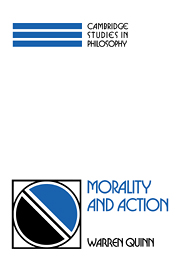Book contents
- Frontmatter
- Contents
- Acknowledgments
- Introduction
- 1 Moral and other realisms: Some initial difficulties
- 2 Abortion: Identity and loss
- 3 The right to threaten and the right to punish
- 4 Reply to Brook
- 5 Truth and explanation in ethics
- 6 Reflection and the loss of moral knowledge: Williams on objectivity
- 7 Actions, intentions, and consequences: The Doctrine of Doing and Allowing
- 8 Actions, intentions, and consequences: The Doctrine of Double Effect
- 9 Reply to Boyle's “Who is entitled to Double Effect?”
- 10 The puzzle of the self-torturer
- 11 Rationality and the human good
- 12 Putting rationality in its place
12 - Putting rationality in its place
Published online by Cambridge University Press: 05 June 2012
- Frontmatter
- Contents
- Acknowledgments
- Introduction
- 1 Moral and other realisms: Some initial difficulties
- 2 Abortion: Identity and loss
- 3 The right to threaten and the right to punish
- 4 Reply to Brook
- 5 Truth and explanation in ethics
- 6 Reflection and the loss of moral knowledge: Williams on objectivity
- 7 Actions, intentions, and consequences: The Doctrine of Doing and Allowing
- 8 Actions, intentions, and consequences: The Doctrine of Double Effect
- 9 Reply to Boyle's “Who is entitled to Double Effect?”
- 10 The puzzle of the self-torturer
- 11 Rationality and the human good
- 12 Putting rationality in its place
Summary
One kind of metaethical debate between realists and antirealists is about the character of ethical truth, with realists asserting and antirealists denying that truth in moral thought transcends our capacity to find reasons in support of our moral judgments. The antirealist in this kind of debate, no less than the realist, thinks that there is objective moral truth and knowledge. And the truth in question is not merely disquotational. Both parties think that a true moral claim corresponds, in some way or other, to the way the world is. Their disagreement, like that of their counterparts in mathematics, is about the nature of this correspondence. The antirealist sees it as a relation between the claim and the publicly available facts that could be adduced as good reasons to accept it, while the realist sees it as a relation to what he thinks of as the truth condition of the claim – a state of the world that may transcend our ability to detect its presence by way of reasoned argument. This issue is surely an important one, but it is posterior to the more fundamental question that has dominated metaethics in the last half-century. This is the question whether what lies at the heart of moral thought are beliefs capable of genuine truth or noncognitive attitudes that cannot be so assessed: feelings, emotions, desires, preferences, prescriptions, decisions, and the like.
Let's use J. L. Mackie's terms “subjectivism” and “objectivism” to name the opposing camps in this older debate.
- Type
- Chapter
- Information
- Morality and Action , pp. 228 - 255Publisher: Cambridge University PressPrint publication year: 1994
- 10
- Cited by



